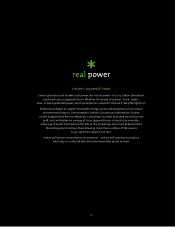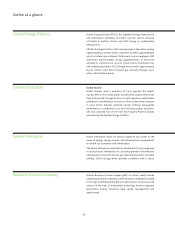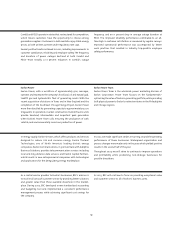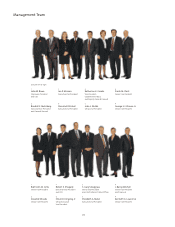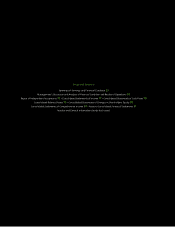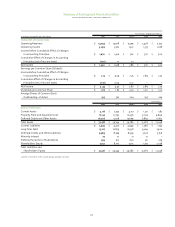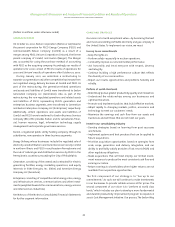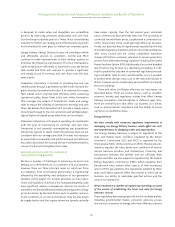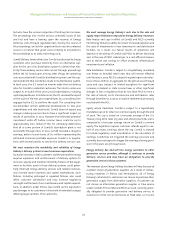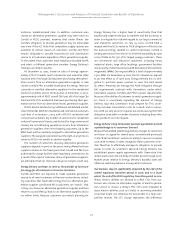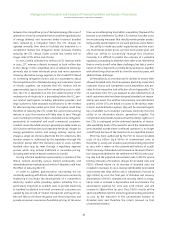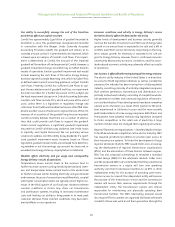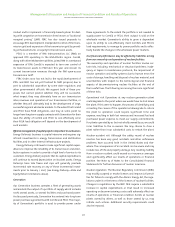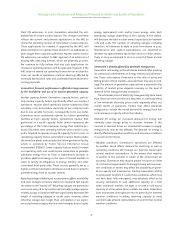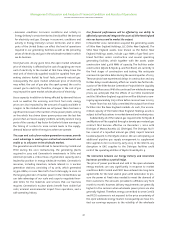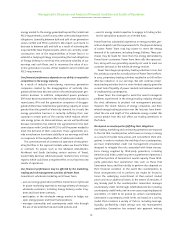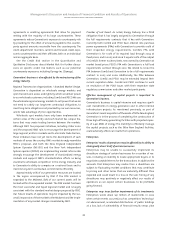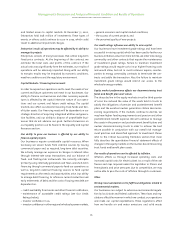ComEd 2002 Annual Report Download - page 27
Download and view the complete annual report
Please find page 27 of the 2002 ComEd annual report below. You can navigate through the pages in the report by either clicking on the pages listed below, or by using the keyword search tool below to find specific information within the annual report.
is designed to create value and strengthen our competitive
position by improving processes, productivity and cash flow.
Our third major corporate goal is to “invest in our consolidating
industry.”To further our strategy,each of the business segments
has formulated its own plans to achieve our corporate goals.
Energy Delivery. Energy Delivery focuses on providing reliable
and affordable services to customers. ComEd and PECO
continue to make improvements to their delivery systems to
minimize the frequency and duration of service interruptions,
while working more efficiently to lower their costs. We believe
that ComEd and PECO will continue to provide a significant
and steady source of earnings and cash flows over the next
several years.
Generation. Generation is focused on providing low cost and
reliable power through a generation portfolio with fuel and dis-
patch diversity. Generation’s direction is to continue to increase
fleet output and to improve fleet efficiency while sustaining
operational safety. Power Team is the unit within Generation
that manages the output of Generation’s assets and energy
sales to reduce the volatility of Generation’s earnings and cash
flows. We believe that Generation will provide a steady source
of earnings through its low cost operations and will take advan-
tage of higher wholesale prices when they can be realized.
Enterprises. Enterprises is focused on operating its investments
with the goal of maximizing its earnings and cash flow.
Enterprises is not currently contemplating any acquisitions.
Enterprises expects to divest itself of businesses that are not
consistent with our strategic direction. This does not necessar-
ily mean that an immediate exit will be arranged,but rather we
may retain businesses for a period of time if we believe that this
course of action will strengthen their value.
business outlook and the challenges
in managing our business
We face a number of challenges in achieving our vision and
keeping our commitments to our customers and our investors;
however, there are three principal areas on which we focus
our attention. First, our financial performance is significantly
affected by the availability and utilization of our generation
facilities. As the largest U.S. nuclear generator, we face opera-
tional and regulatory risks that,if not managed diligently, could
have significant adverse consequences. Second, our results of
operations are directly affected by wholesale energy prices.Energy
prices are driven by demand factors such as weather and eco-
nomic conditions in our service territories. They are also driven
by supply factors and the regions where we operate currently
have excess capacity. Over the last several years, wholesale
prices of electricity have generally been low. The possibility of
continued low wholesale prices, coupled with a continued eco-
nomic recessionary trend, could adversely affect our business.
Finally, our business may be significantly impacted by the end
of ComEd’s regulatory transition period in 2006.By existing law,
after 2006, ComEd will not collect competitive transition
charges (CTCs) from customers who elect to receive generation
services from alternative energy suppliers including the ComEd
Power Purchase Option (PPO).Additionally, the current bundled
rate structure may be reset in a regulatory proceeding. It is dif-
ficult to predict the outcome of a potential regulatory proceed-
ing to establish rates for 2007 and thereafter, nor is it possible
to predict what changes may occur to the restructuring law in
Illinois;however, we are undertaking various efforts to mitigate
the 2007 challenge.
These and other challenges affecting our businesses are
described below. There are several factors, such as weather,
economic activity and regulatory actions that affect Energy
Delivery, Generation and Enterprises in different ways. Also,
there are several factors that affect our business as a whole,
such as environmental compliance and the ability to access
capital on a cost-effective basis.
Energy Delivery
We must comply with numerous regulatory requirements in
managing our Energy Delivery business, which affect our costs
and responsiveness to changing events and opportunities.
Our Energy Delivery business is subject to regulation at the
state and Federal levels. ComEd is regulated by the Illinois
Commerce Commission (ICC) and PECO is regulated by the
Pennsylvania Public Utility Commission (PUC).These state com-
missions regulate the rates, terms and conditions of service;
various business practices and transactions; financing; and
transactions between the utilities and our affiliates. Both
ComEd and PECO are also subject to regulation by the Federal
Energy Regulatory Commission (FERC), which regulates their
transmission rates, certain other aspects of their businesses
and, for PECO, gas pipelines. The regulations adopted by these
state and Federal agencies affect the manner in which we do
business, our ability to undertake specified actions and the
costs of our operations.
We are involved in a number of regulatory proceedings as a part
of the process of establishing the terms and rates for Energy
Delivery’s services.
These regulatory proceedings typically involve multiple parties,
including governmental bodies, consumer advocacy groups
and various consumers of energy, who have differing concerns
Management’s Discussion and Analysis of Financial Condition and Results of Operations
exelon corporation and subsidiary companies
25


